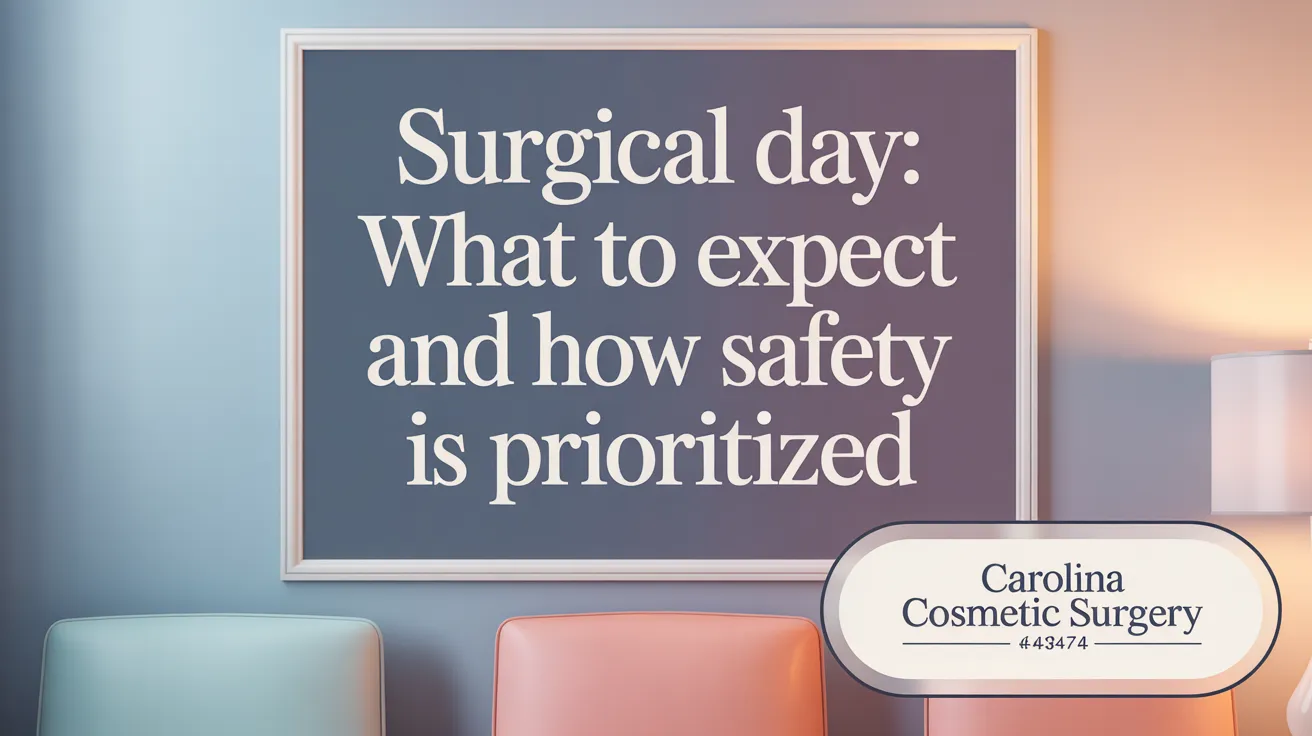Understanding the Journey from Consultation to Recovery
Embarking on a cosmetic surgery journey is a transformative experience that involves more than just the procedure itself. From the initial consultation through recovery and ongoing care, understanding each stage is essential to making informed decisions, preparing adequately, and optimizing results. This guide walks you through the comprehensive process, emphasizing preparation, safety, emotional wellness, and post-operative management to help you confidently navigate your cosmetic surgery experience.
<!-- VIDEO:eyJsaW5rIjoiaHR0cHM6Ly93d3cueW91dHViZS5jb20vd2F0Y2g/dj1RSkJjcnhIMXMyYyIsImltYWdlVXJsIjoiZGF0YTppbWFnZS9qcGVnO2Jhc2U2NCwvOWovNEFBUVNrWkpSZ0FCQVFBQUFRQUJBQUQvMndDRUFBa0dCd2dIQmdrSUJ3Z0tDZ2tMRFJZUERRd01EUnNVRlJBV0lCMGlJaUFkSHg4a0tEUXNKQ1l4Sng4ZkxUMHRNVFUzT2pvNkl5cy9SRDg0UXpRNU9qY0JDZ29LRFF3TkdnOFBHamNsSHlVM056YzNOemMzTnpjM056YzNOemMzTnpjM056YzNOemMzTnpjM056YzNOemMzTnpjM056YzNOemMzTnpjM056YzNOLy9BQUJFSUFGTUFsQU1CSWdBQ0VRRURFUUgveEFBY0FBQUFCd0VCQUFBQUFBQUFBQUFBQUFBQUFRSURCQVVHQndqL3hBQThFQUFDQVFNREFRY0JCZ01IQkFNQUFBQUJBZ01BQkJFRkVpRXhCaE1pUVZGaGNSUUhJektCa2FGU1lyRVZRbktTd2RId2dxS2o4UmNrSmYvRUFCZ0JBQU1CQVFBQUFBQUFBQUFBQUFBQUFBRUNBd0FFLzhRQUlCRUFBZ0lDQWdNQkFRQUFBQUFBQUFBQUFBRUNFUU1oRWpFVFFWRWljZi9hQUF3REFRQUNFUU1SQUQ4QTZhQ0IxT0tjQkhUSXJBZmFwbkdrQkJsekpJRngxejRlbEo3SzZwY2F2Mm10TGk0czNsbWd0UHA1cE1Ed01DM2pPZW5CeGpybk5hT0M4Zk93eno4WjhLT2hibEF5V1hIelNrWlcvQ3dQd2F5bWxQdjdTYWhER0lqc2tIQ3J0WHI2Zjg1clJ6d0Z4Q2txcW1aY2d4K1JDdGcvSU5UbkRpNkd4Wk9hdWlWa0x5U0FQZWpWbFkrRmxQd2FpeHQzbDBpVEJlOFNOd3d4d2VVd1I3SC9BSEhsVDFraXJFMjFRUHZKT2cvbk5JVUhzVWVLVUJSZ1ZqQ2NVTVU1dHJudjJ3ZG8zMDNTbzlIc21aYnEvVW1TUlRneHdnOC9tM1Q0eldNVCswLzJpOW4reis2SXovVzNZNDdpMkliQi9tYm9QNisxWWovNVExKy9sTDIwZGhhdytTTEcwamY1aVFQMnJsejVrdUZodDQyZVJqaFVqWEorTVZzZEU3STY5SkNHYUdLM0I4cE1aL2FqcExabGI2TGQvdGIxMnh1dnY0TFM1aUhWR1hhVC93QlE2ZnBYVE5BN1o2SnJXbVFYcTMwRnEwaDJHQzVtVlhWL1RyejdIenJsVGZaMWYzQkxYTjdFUDhNZFF0UzdGWCttV3BlQmx1RVg4UzQ4cUZ4RFRQUVhrQ0R3YUZjVCt6UHRiYzZUcXNHajNVelM2YmNPSTBTUnNtMmM4RGJuKzdrZ0VkUFBqejdhUlFaaEpGSWJnOURUbElreGtaeDA5dlVWa1lJYzBLQ2dZL00wS3diS0h0RjJjaTErU3hlVzVrZytqa01paEZCM0hLOEhQK0duUm9Md2FuZVgybTN6V24xaS9mUTkwSFV2Z2dPTTlEL1duTlJ1N3RkUWhzcktTM2laN2VXZHBaMUxEQ0ZSakFJL2l5VDVBVkVYV3J3eXZNUHBUYlJYY05xMFNBc1hNaW9kNnZucGwrT09RUGVyUlU2cE1qSnd2YUhkQzdMd2FTazMvd0JoN21hWmdYa2xRSGdIT01lL3JWdEhaTkhrSk1FQi9naVVIUHIvQUYvV3MxWjlxTHlhM3NGYU9ENm1XNVJiakNuYUlXWlFwSFBVN3dQbFdwVnAyaDFaN0pia3dvOGJMR1RJYlo0MWpkcGtUYUNUaDhxekhJNllwcFk4a25jaWNjbU9LcUpweGJ6ZFRjNWZ5YnV4d1BUNHB5Q0tXTW5mS0pBYzhiQXVLcTcyK3YxN1JMcDlzQXNRZ2psWmhiR1FqYzdBNU80YlJoZXZOUVo5VzFpMmcxSm1tdHBHdEx5RzFWVXRUbGkvZGVMRy93QkpDTWZITktzYlk3eXBHcUFvOFV4cDVuZTBqYTdKNzA1em1MdXoxNDhPVGo5YWs0cEdxSHV3cTgvL0FHejN4YnRaT2lLUzZJa1NMbnlBem5IcGxqWG9JQ3ZQL3dCcFZxajlyN21VWloydWhDQVRuR2NmOCtBS3hrVHZzKzBDR3lzbHZKRURYa3d5MGgvdWowSHBYUkxXTmRneUt6VzVyR0tPM2htamhiQUdTbS9INVZNdE5UMUswbVFYa2xyTENlckJDclkvV292YnN1bFNvMFhkSmpwVUM2aEhPQndmS3BkL3FTV3RvSlZSQ3pEd2hqd2F6eDFYVlpTc2p3V0tSTWVqTTJTUG5uRkNqSE8rMXRrdWxkckxlYUFCSTNrVjJ4NUhkMXIwTzQ4UlB2WENmdFdqOGRoS0ZJYVZXWEE1UEdPUDNydU5rSkJaVy9mREV2ZEp2SDgyQm45Nm91aWI3RkdrUHdSOGV2eFQyMm0zQnlPdlQzOVJXQUpBNC9NMEtVQWYzTkNzYXpQOW9wcmJmRGJUMkZyZU1JNUp6OVZLSTBqUmRvSjNFSGtsZ01kUFUwaGIyeGt1RGUvMlpBWjRybTN0MGx5cGI3eFVJSUlCSEFrSTRKSEhCNXB6dEJMWkpjd2ZVUlhwblczbWtFbG9RQ3NJMjk1dXlSa2NyeHllS1pnVFJGZFpZRnVSSERkVzhBaVZ6c2VRS2dqY2dubkFaZWZib2NWMFJYNVJ6emY2ZlF6YjZwWmtSeXJvbHV0dEhiMjhzcmlRYm8xTWpCTURiNGdwQmJxT3ZGVDlJdXJmVjB1Tk9iVDdCYktFdW5jQ2NzM2drd01wc0FBSkdlcDhxcklwdXpzZmlJdmdzTmdsd1lTL0VzVWJ1VkJBUGlJTzQ0UDcxYVdGM1lhZmV5UlF0ZjhBY3ROTEdHYzdvTytPWkdWZlBkK0xuR001R2FlU1ZhUXNXNzIwVjZTVzhabmt1T3ptbm8xbFBIYVI5MWNGaVpuWkNpak1Zd3VaY2x1bzU0cTdzRnRkVmkxQzN2ZE90MG1XNUMza1FQZUk4Z1ZHVmcyQnU4T3pCSUI0OXFyb3IzUjcyR1dPUzF2WS93QzA1cmU0QWt3R0pjcXNjaWtOd0FVVTljZ2pwelZyRExwK2pYdHZwd016WE9vU1BLWkhPOHN3QTVkdkxJQUErTUNsbC9OaGo5dlJZMmx0Qlp3Q0cxaFNLSmVpSU1BVStCVlJCcjhWd1poYldOOU1zYk9vZEkxMnVVYmF3QkxjRUh5YkdjSEdhUkgyb3NqYVJYYzhGM2IyODBMeXhTU291SkZWUTJCdFk4a0hnZFRnMVBoSmo4NC9TOHJrbmFyUmhMMitrYVFlRXV0d0RqZ2dMLzdycTFwY3hYU04zYkRmR1Fzc2VRV2lZcUcydGpvY01QMXJOZHJOTm1rMWEwdllZWkpGSzdKQ2dKMjhIaysyRDFxY3JLUWFzemsyaTJtc0xpNkRFQTV3R0l6OCt0UFdmWml3MGkwUGNJd0hQQkp4a2pIUFBOSnNyeG9KV1VqT0tmMU43Kzd0bE5uUEFyYytHWWVFMVBmUjAxN0hyaTBqdWJlMmpsQjI3TnZYcFZOUDJRSzNja3lYOXlxczRZSjNwd295ZUFEeGpuM3Fha3ZhR1pZSTU0cmFJSnc3TWZ4KzY0cVBxbW82cFp6dXJDTzZ0OTI0TDBaYXhxc2lkb2RIZS8xVFFJb2RwYUs2R04zUFFnLzZWMVVqcldEMHE0a3Y0MXViYXdsVjR2RnZpOFJYNDg2dkxYV25QM2YxTWNraTlVbFhhdy9wUlRyc25KVzlGOTFHUnlLU1ZCNUlHYXk5dk5jVys1VUxMSG53dEdSa0QwT1J6aXJheTFNRWQzZE5nK1VtTUEvSThqKzFIa2dPTFJZWXgwbzZWMTZVVk1LWm50UFk2WGNTUXZxbHozUitubGlqVUp1SXlVSmtBd2Z3N1IxNDU1cEgwT2pQcUo3eTZnZlVKYnVHNUU0aEdRUXFFSUg4Z3dYSUdmT3B1cVF5SnFFRjdiWE5uSE10dkpDVXVuMnFWWXFkdytDdlR6OVJVY2FUSzF5MEMzZG8wRTl4RGV2amlUS0JPRlhwdEpRSFBsa2ptdWlMMHRuUE5mcDZJRDZSb2R6cFJEYXQ5MUxhN1lwd3VOZ2laOTdmK1FxUWZLckMzdHRQdXJzSkRxYm1FM0V0d3RvWXRyTE5zOFdTUmtBYjkyRDZqbkZRN1hzeWJlU0dHTzhzaTMwa2tjdHRJTnl0STIzeGJlRGdoUm40QnFSYldOMUZzdW90UXNaV3QyazJ4U1hMT2tVYm9xNE1oOFJ3Vnp5UFBGTzJuMUltazEzRVZaYWJvNTBXRk5LdUVWclZMYWQ3cU8zM1BJRUFkR1lkVGtjNEhyVGNzT21haEhkNnJjYXhPV3RsajNYQWllS09MdTNKSGg2TjRzNUg1VkwwTFRwOUVlS0pMbXpsdFpZYmVJTzhoVjI3dU1MbFJqQnpqUFdpYlI1VzAyT3phL3Q0NGpxVTF4SzR3MlFaWGtWQUR4bmNWem4rRTB2TGZZM0YxMEdzZW42WnJmMWR6cU1qVFhFVExHRXRUbVVNZHczTWcrOEtnSEhtQm5ORk1ORWgwWFRMRzQxQlRGWlNveVNOSHVKTURZWWtZOElCR0MzUVpweXh0QkRiNk1rbXAya2k2Wk0vajcwZU5Oam9nL3hZSXo4R21ob3QxYi9VdmEzbGx2bVdlR1h2U2RxTExLem9SanpHL0dEalBITmJYMEc2Nkx1UFZiTkpibFpiK055bHhIRVYyNE1iU2JRaThkY2s5ZmYycXlLaGdWUFFqQnJIbnNkSXR5czBGMHFzdDlieW5JUDNrRVlpOExmemJvc2crNTlUV3d6VTVLUHBsSU9YdEhQWHR4Ylg3eHlyK0ZpQ1BVVlVmMk5iYWZmdEtMWjd1M2xPN0R6TVNtZlRtcmp0amRpMjdRU1J2d3JSb3luM3h6L3BVS3c3UjJrWjd1VjFPUFU4aXVkcW1ka0phRjM4T25USnN0TkwrOGJPR0VzbmhvN0RTWWJEVHU2a2trbWxjN3BIbGZjZmdlMVRKKzBGZzY1VmxCcHpzeE9tcmF5Tnk1aGlReUQwSkJHUDYxdTJGeXBHbTAyR1BTTkVqV1k5MmtTRjVENkU4bi9hc25xdXFycmVvV3R1dG5Fd2pidkk5NSs4NDl4MCtLM2x4RkhQQzhVeUI0M1VxeW56QnJtT24yY1duOXJycUJ1OXQxUm1DTktjbHhuam4weFRTNkpZNnMxRzN3OGpIcXJWSHVPRktzdTRldnBVNXZIeXBWaDdVMjhSWVlJTlRLV0hwZXBwRGFMRk1IZmFTRksrbEhWZTluSHVQT1B6b1ViWXRJc2Rac1ByVFpFVzhjclIzY2J1V0E0UUU1NitYdFVBYVZjalUvRFpxUDhBOUJib1hvWmVJZ29Hekg0czRHM0dNWXJRWk9lT25GR0dPTTU4dlQyK2E2SXphVkVKUVRkbWV1dEd1NWRka3ZlNlJvRGV3eVlBVU9WV01EY0dQSUFicXZtTTFFMHpTTCtEVGRQaW4wK1Z6YVN4U1RRdjNHSlFGZGNLVlBPQ1ZieG55OWExKzQ1L1AvWDVvMVluSHY3ZTN6VGVWMEw0bGRtU3ZkR3U1WXJqdTlIakF1ckY3ZUNFVEtSWnVaSGJlU1R4bmNoT3pPQ21Ca1lOUzVkRHV6cWs2N1E5bHRlN1J0dzV1V2k3c2pIK1pzK3JWcHFNR2g1Wkc4TVRHVytoNmpKWTZiQXRzWVpiY2t1OTFGQTZEN2xsSGhUOFEzY2M4ODFZV0dnT2x6b3JOQkpIQkRhcjlWRTBpc0RMRUIzVzdIWEJaeng2RDBGYVVHakJyZVZzQ3hKRHVlYVZtbWcxUk5RMVcxc0ZQZVB1azhvMTZuL2I4Nm1Vb3hmYk9BWFdzejhaMkJWLzdSV1NiUWt1WkM0eUQ1NHJWdmNtNXVwSlpzRnBHSlA1MHUzalNOMkdCZzFGdlowSmFNeGE2QUkzd1NTRFc2N0dXaTJ0M0lxakgzSi9xdFJZNDBMN3NEaWlOM1BiM08rMWtLTUJqT0FlUFNzblROSldxTndUV1g3VGRsVHExMTlkWlhwdGJ2WUZPNU55TmpwN2lrcDJvdUlBUHE3VlpCL0ZHZHAvUTFJaTdZYUsvRTl3OXMzcE1oSDdqSXF0cGtlTWtWOWxvR3VXZHZtUzh0YmlVSDhDaGtCSHlmT2tUYXROWkhacUZ0TmJucHVkZkNmaGh3ZjFxZmNkdCt6c0xFSFVReC9raWMvdmltNCsydlp5NkJqK3ZVQnVNU1JNQWZuSW9OSWEzN0l5YXhhU3J1VmtJOTZGVGphOW1iejc4SnByN3Y3eXNveitsQ2h4RHlMTWRlZ3B3QVk2VUtGT2hXR29HZWxLQUF4eFFvVm1BVUtNVUtGQUlkS0ZDaFdBeXI3UVhNMXZiUjl4SVUzdnRKSFhIejVWbVpnTU1mTTlTZXBvVUtua0tZK2lNQndUVDhmbFFvVWhSRWhTZHBwQkEzRDVvNkZZQWkvVWJPbFpxN2pSbU81UWFGQ2lFZ3kyMEpYbU5hcXJxM2hYSlZBS0ZDbVFDQVpIVWtCaUFQZWpvVUtjUS8vWiIsInRpdGxlIjoiQ29tcGxldGUgR3VpZGUgdG8gUmhpbm9wbGFzdHkgRnJvbSBDb25zdWx0YXRpb24gdG8gLi4uIiwic25pcHBldCI6Ii4uLiBjb25zdWx0YXRpb24gdG8gZnVsbCByZWNvdmVyeS4gRHIgLi4uIExpc3RlbiBub3cgZm9yIGFsbCB5b3VyIGZhY2lhbCBwbGFzdGljIHN1cmdlcnkgYW5kIEVOVCBxdWVzdGlvbnMgYW5kIGdldCBpbnNpZ2h0cyBmcm9tIHRoZSBleHBlcnRzLiJ9 -->The Initial Consultation: Setting the Foundation for Your Surgical Journey

Purpose and importance of consultation
The initial consultation in cosmetic surgery is a crucial first step. It allows the patient and surgeon to meet, discuss goals, evaluate physical health, and explore the best options for achieving desired results.
Discussing medical history and aesthetic goals
During this face-to-face meeting, the surgeon reviews the patient’s medical history, including any medications, allergies, previous surgeries, and overall health. Patients are encouraged to share their aesthetic goals openly. Visual aids, such as before-and-after photos, help set realistic expectations.
Evaluating procedure suitability
The surgeon assesses whether the patient is a good candidate for the procedure based on physical condition, genetic factors, and personal health. This evaluation helps identify any potential risks and ensures safety throughout the process.
Surgeon selection and research
Choosing the right surgeon is vital. Patients should research credentials, experience, and facility accreditation. Reviewing before-and-after photos and reading patient reviews can provide insight into the surgeon’s skill and aesthetic style.
Key questions to ask during consultation
Patients should prepare questions, such as:
- What are your qualifications and experience?
- Which anesthesia options are available?
- What does the recovery process involve?
- Are there any risks or side effects?
- What are the costs and payment options?
- How many similar procedures have you performed?
Understanding risks, benefits, and costs
Clear information about potential risks, realistic outcomes, and financial considerations is essential. Surgeons often explain procedural techniques, anesthesia safety, recovery timelines, possible complications, and costs including surgeon’s fee, anesthesia, facility charges, and follow-up care.
This foundational consultation ensures patients are well-informed and prepared, making it easier to proceed with confidence in their cosmetic journey.
Pre-Surgical Preparation: Optimizing Your Health and Setting Up for Success

How should individuals prepare for cosmetic surgery, including important consultation questions and safety considerations?
Proper preparation is essential for a successful cosmetic surgery outcome. The process begins with a comprehensive consultation where a qualified plastic surgeon evaluates your medical history, discusses your goals, and reviews your physical condition. During this meeting, it's important to ask questions about the procedure’s techniques, anesthesia options, risks, expected results, and recovery process. Being transparent about your habits, medications, and lifestyle helps the surgeon assess potential risks and make necessary safety adjustments.
Patients must follow pre-operative instructions precisely, which often include avoiding eating or drinking before surgery, quitting smoking, and stopping certain medications that could increase bleeding or interfere with anesthesia. Additionally, arranging transportation to and from the surgical facility and organizing support for post-operative care contribute to a smoother recovery. Clear communication with your healthcare team about your expectations and concerns ensures a safer, more satisfying experience.
What emotional and psychological considerations should patients be aware of during the cosmetic surgery process?
Emotional and mental readiness play a significant role in cosmetic procedures. Patients should reflect on their motivations and ensure that their goals are realistic to avoid disappointment. Surgeries can evoke a range of feelings, including excitement, anxiety, or even post-operative sadness.
Screening for mental health issues like depression or body image disorders before surgery is recommended. Seeking support from mental health professionals or support groups can prepare patients psychologically, helping them manage expectations and cope with potential emotional ups and downs.
Maintaining a positive outlook and understanding that final results may take weeks or months to manifest is vital. Openly discussing emotional concerns with your surgeon can lead to better preparation and a healthier surgical experience.
Preparing for surgery involves attention to lifestyle adjustments and health evaluations.
Lifestyle modifications such as quitting smoking and avoiding blood-thinning medications reduce surgical risks. Medical evaluations, including blood work, EKGs, or other lab tests, ensure you are fit for surgery. Adhering to these preparations minimizes complications and supports optimal healing.
Planning logistics—like transportation and post-surgery help—reduces stress and helps you focus on recovery. Additionally, scheduling pre-operative appointments allows your surgeon to review test results, confirm readiness, and provide detailed instructions tailored to your specific procedure.
Finally, adopting a healthy lifestyle—proper nutrition, hydration, and rest—enhances healing and overall satisfaction with your surgical results.
Understanding Your Cosmetic Surgery Options and Treatment Planning

What are common cosmetic surgery procedures and options, and how is treatment planning conducted?
Popular cosmetic surgery procedures include breast augmentation, rhinoplasty (nose reshaping), liposuction, facelifts, and tummy tucks. Non-invasive treatments like Botox, dermal fillers, and laser skin resurfacing are also widely used to enhance appearance with minimal downtime.
Treatment planning starts with a comprehensive consultation. During this session, a qualified plastic surgeon evaluates the patient’s physical health and discusses their aesthetic goals. The surgeon reviews medical history, examines the targeted areas, and discusses potential risks and benefits.
Personalized plans are created based on individual needs and expectations. Visual aids and before-and-after photos help patients visualize possible outcomes. The surgeon also explains anesthesia options, recovery timelines, and the costs involved.
This collaborative approach ensures that patients have realistic expectations and are fully informed of the procedures suited for their specific circumstances. The process emphasizes safety, clarity, and shared decision-making.
By thoroughly understanding options and engaging openly with your surgeon, you can create a tailored treatment plan aligned with your goals.
Important steps in pre-surgical assessment and planning
- Reviewing medical history and current medications
- Physical examination of targeted areas
- Discussing aesthetic goals and concerns
- Explaining risks, benefits, and recovery expectations
- Reviewing costs and payment options, including financing
- Preparing physically and emotionally for the procedure
Selecting a qualified, board-certified surgeon with extensive experience and accredited facilities ensures safety and optimal results.
Understanding your options and having a clear, personalized plan are crucial for a successful cosmetic surgery journey.
The Day of Surgery: What to Expect and How Safety Is Ensured

Surgery day preparations and check-in
On the day of surgery, patients should arrive as scheduled, with all necessary paperwork, identification, and pre-operative instructions completed. It's important to organize transportation in advance, as patients will not be able to drive after anesthesia. Before entering the operating room, the medical team reviews the patient's details, confirms the surgical site, and ensures all preparations are in order.
Types of anesthesia and monitoring
Depending on the procedure, anesthesia options include local anesthesia with sedation or general anesthesia. The choice is made after discussing with the surgeon, considering the complexity of the surgery and patient comfort. During the operation, continuous vital sign monitoring — including heart rate, blood pressure, oxygen levels, and respiration — ensures safety throughout the procedure.
Surgical procedure environment and safety standards
The operating room is a sterile, controlled environment equipped with state-of-the-art technology to maintain safety. Strict protocols are followed to prevent infections and ensure proper sterile techniques. Facilities are typically accredited and adhere to safety regulations set by health authorities.
Immediate recovery and monitoring post-procedure
Right after surgery, patients are moved to a recovery area where they are closely monitored by medical staff. This period involves managing discomfort, observing for any adverse reactions, and ensuring vital signs remain stable. Patients may experience swelling, bruising, or mild pain, which can be alleviated with medications and supportive care.
Understanding these stages helps patients prepare mentally and physically for their surgical day, emphasizing the importance of safety protocols and attentive monitoring to achieve the best possible outcomes.
Recovery Expectations: Timelines, Care, and Managing Healing

What are typical recovery expectations and timelines following cosmetic surgery?
Recovery after cosmetic surgery varies based on the specific procedure performed. Patients often experience initial swelling, bruising, and discomfort during the first few days. The early recovery phase generally spans from day 3 to about two weeks, during which patients can usually resume light activities and work, depending on the procedure.
As healing progresses into the intermediate stage, typically weeks 2 to 6, swelling and bruising diminish, and normal activities are gradually resumed with some restrictions. Final results become more visible as tissues settle, with full recovery taking several months. For instance, procedures like rhinoplasty might take up to a year for final contours, while others like liposuction might recover more quickly.
Adherence to post-operative instructions—such as activity restrictions, wound care, and medication use—is crucial for optimal healing. Recognizing these timelines helps set realistic expectations and ensures a smoother recovery process.
Emotional and Psychological Support Throughout Your Cosmetic Surgery Experience

What emotional and psychological considerations should patients be aware of during the cosmetic surgery process?
Patients often experience a range of emotions during their journey, including excitement for the possible enhancements, anxiety about the procedure and outcomes, or even disappointment if expectations are not met.
Managing these feelings is crucial for mental well-being and overall success of the surgery. Incorporating psychological assessments or screenings before surgery can help identify individuals who might be at risk for emotional difficulties post-operation.
Support systems, such as counseling or therapy, can be very beneficial. These resources provide a safe space for patients to express concerns, manage stress, and develop realistic expectations. Open and honest communication with the surgical team also plays a vital role in aligning patient hopes with achievable results.
Understanding and preparing for the emotional aspects of cosmetic surgery can lead to a more positive experience and improved satisfaction with the outcome.
Empowering Your Cosmetic Surgery Journey
Navigating the path from initial consultation to full recovery requires informed decision-making, thorough preparation, and ongoing care. By understanding the procedural options, preparing physically and emotionally, adhering to safety and post-operative guidelines, and accessing proper support, patients can maximize their satisfaction and outcomes. Remember, successful cosmetic surgery is a journey—not just an event—and partnering with a qualified, compassionate surgical team is key to achieving your desired results safely and confidently.
References
- Steps From Consultation to Recovery for Plastic Surgery
- Navigating your Plastic Surgery Journey: Steps After the ...
- Navigating Your First Plastic Surgery Consultation
- From Consultation to Treatment: Navigating Your Skin ...
- From Consultation to Recovery: What to Expect During ...
- Typical Recovery Timelines After Plastic Surgery
- Preparing for Your Plastic Surgery Journey
- How to Prepare for Your Cosmetic Surgery Journey
- Cosmetic Surgery: What It Is, Types & Common Procedures
